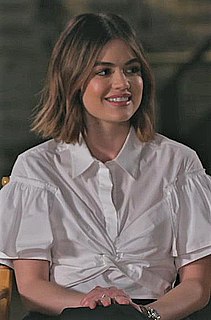A Quote by Kim Harrison
If I give a book as a gift, it is invariably a children's book with beautiful artwork and a simple text. I adore the feel of them, the care taken in the artwork, and the high visual stimulation that sets off the simple but often powerful message the text conveys.
Related Quotes
Generally, the imagery and the text go hand in hand. It's much easier when the text comes first, but sometimes I need visual stimulation in order to find the words. I get an idea of what I want when I begin to shoot, and the text is usually the last thing to be resolved. I tend to leave the text open, and I refine the words up to the last minute. As for the image, I can resolve that and get that done fairly quickly.
Whenever I work on an album and the time comes to do all the artwork, the only thing I think of is the LP artwork. When we worked on the 'Electric Trim' artwork, we spent weeks and weeks making the LP artwork great, and then the CD artwork came together in a day or two. The LP is what's important to me.
Literature is not exhaustible, for the sufficient and simple reason that a single book is not. A book is not an isolated entity: it is a narration, an axis of innumerable narrations. One literature differs from another, either before or after it, not so much because of the text as for the manner in which it is read.
I overanalyze things way too much, to the point where it affects my life. Like, when I'm talking to a boy, I'll overanalyze a text message he sent. And I have to think to myself, 'Just chill out. Some guy sent me a text message. That's all. Don't read something into it that's not there. Just be glad he sent you a text message!'
With Orff it is text, text, text - the music always subordinate. Not so with me. In 'Magnificat,' the text is important, but in some places I'm writing just music and not caring about text. Sometimes I'm using extremely complicated polyphony where the text is completely buried. So no, I am not another Orff, and I'm not primitive.
The inspiration is all in the script, in the text. So whatever it is, either it is a film or a book to be illustrated, anything. Everything you need to know is in the text. So the thing is trying to find right tone and voice, the right style, the right way of expressing the emotions in a story or in the location of the story, but it is all in the text.
We had collaborated with Allen Ginsberg on one of his last projects just before he died in the spring of '97, a book called Illuminated Poems - it was Allen's poems and songs and I illustrated them. Or, I illuminated them with paintings and drawings that bounced off of them. You want the picture to relate to the text without it slavishly regurgitating it or merely illustrating it, because that's redundant. You want to show another angle of what the text is saying.
You will want a book which contains not man's thoughts, but God's - not a book that may amuse you, but a book that can save you - not even a book that can instruct you, but a book on which you can venture an eternity - not only a book which can give relief to your spirit, but redemption to your soul - a book which contains salvation, and conveys it to you, one which shall at once be the Saviour's book and the sinner's.
When you hit send on a text or tweet, you lose ownership of it - but you don't lose responsibility. Every text you have sent may have been saved and could be out there waiting to be used in ways you didn't imagine. Even the most simple of posts can be used out of context, often unintentionally, and change your future.



































